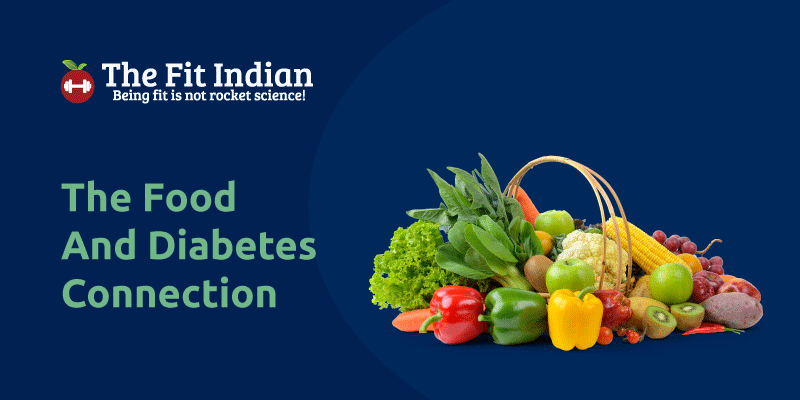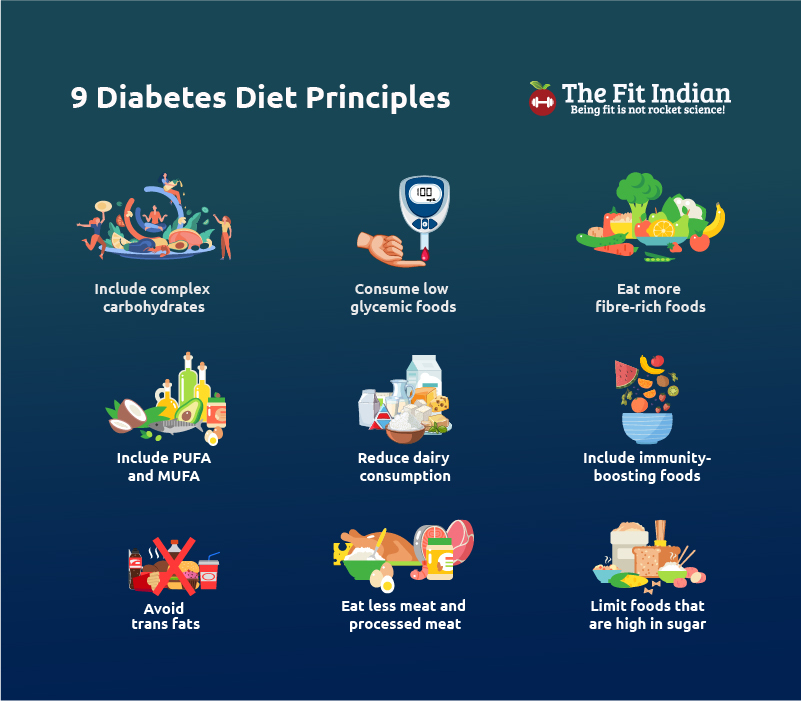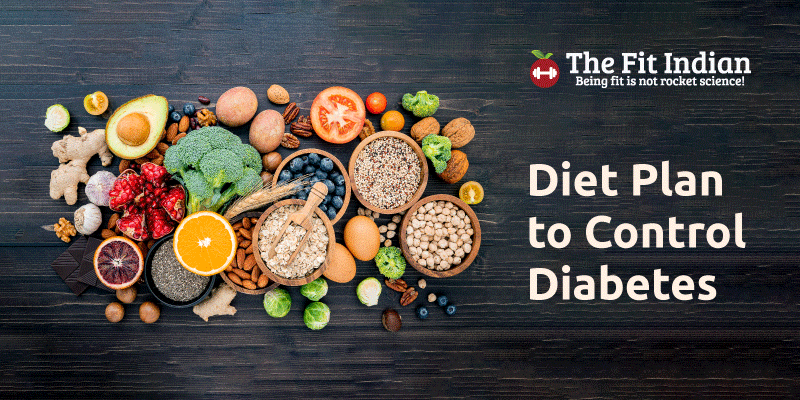How to Control Your Blood Sugar Levels with Diet and Lifestyle Changes
Reviewed by: Dr. T S Deepthi Sarojini | Author: Manoja Kalakanti
Diet is one of the most critical components of controlling the condition. Some foods can cause fluctuations in blood sugar levels while others keep it steady. Thus, what you eat can make or break your effort in keeping diabetes under control.

Many other factors result in these fluctuations, such as genetics, physical activity, weight, stress, and sleep. But, the role of diet in maintaining sugar levels is vital. This article will talk about 9 ways to manage sugar levels and control diabetes through diet. Let’s first understand the relationship between food and diabetes management.
Relation Between Food and Managing Sugar Levels to Control Diabetes
Your body converts the food you eat into sugar (glucose). This sugar that circulates in the blood is used for energy and is called blood sugar. Too much sugar in your body has a detrimental effect on your health and causes diabetes – a condition characterized by excess sugar in the bloodstream.
Your body breaks down food differently; it separately breaks down the protein, fats, carbohydrates and vitamins. Carbohydrates have the highest impact on your blood sugar levels. Carbohydrates are broken down and turn into blood sugar. The more carbs you eat, the more sugar will be released into your bloodstream. Carbs in liquid form are absorbed even quicker; thus, it instantly spikes your sugar levels.
So what is a healthy blood sugar range? A blood sugar level less than 140 mg/dL (7.8 mmol/L) is normal.

But fibre is one such part of carbohydrate that is not turned into sugar; hence it helps control the blood sugar levels. Therefore, the food you eat directly impacts the sugar levels, either increasing it quickly or causing a slow, gradual increase.
Continue reading to learn about the 10 diet principles that will guide you on how to maintain sugar levels in your blood through a proper diet.
9 Diet Principles to Maintain Sugar Levels
Your diet has a massive influence on the management of diabetes. The ability of food to lower blood sugar or spike it is well researched. Often, a significant impediment in the successful management of diabetes is a lack of a disciplined diet.

While the importance of diet in maintaining healthy sugar levels is well known, it is equally important to engage in physical activity, control stress, and get adequate sleep. Below are some of the critical diet principles to follow for effectively controlling diabetes:
1. Include complex carbohydrates
For a long time, carbs had gained a bad reputation due to fitness experts. This misconception has been put to rest, as people have realised the incredible health benefits of carbohydrates. But, eating the right type of carb in the right amount can be healthy and help maintain sugar levels. Your body breaks down carbs into sugars, which is then used by the body for energy.
And since they are so quickly broken down into glucose for energy, carbs have a significant impact on your blood sugar levels compared to fats and protein. So, you must ensure that your carb intake is under control, but there is no need to avoid it. Avoid unhealthy refined carbs such as white rice, white bread, candy, soda and other processed foods.
These unhealthy carbs cause a spike in sugar levels. Instead, eat healthy, complex carbs such as whole fruits and vegetables, lentils and whole grains. The healthy carbs contain fibre, which is absorbed slowly, and does not cause any spike in blood sugar levels.
2. Low glycemic foods need to be consumed
The glycemic index shows the absorption and digestion of foods and the resultant rise in blood sugar levels. Foods high in glycemic index cause a spike in sugar levels, while low glycemic index foods cause blood sugar levels to drop. Eating low to moderate glycemic index foods such as oats, beans, lentils, legumes and non-starchy vegetables help in reducing the glycemic index. It is not the type of carbs that determines the impact on sugar levels but the amount you consume.
3. Include more fibre-rich foods
Fibre slows down the digestion and absorption of carbs and sugar. This helps control the swing in blood sugar levels. It has a satiating effect and is also good for digestive health. There are two kinds of fibre – soluble and insoluble. While they are both beneficial for health, soluble fibre is known to affect the management of diabetes positively. Incorporate fibre rich foods such as whole fruits, vegetables, and whole grains into your diet to control diabetes.
4. Include PUFA, MUFA (Polyunsaturated fatty acids, Monounsaturated fatty acids)
Include PUFA and MUFA oils instead of saturated fats. MUFA is known to improve cholesterol and keeps blood sugar levels under control. Omega-3 is rich in PUFA, and helps in managing depression and anxiety. MUFA-rich foods include olive oil, almonds, cashews, avocados and peanut oil. PUFA sources include flaxseeds, walnuts, peanuts and sunflower seeds.
5. Low dairy consumption
If you are wondering how to regulate blood sugar, you might want to cut down on dairy consumption. Dairy products such as milk, cheese, and yoghurt may not cause an immediate spike in blood sugar levels, but consistent consumption may lead to insulin resistance. More study is required to determine the effects of dairy on people with diabetes.
6. Immunity boosting foods intake
People with diabetes need to improve their immune strength, especially with COVID-19 around. Diabetes can weaken your immune system, thus making you vulnerable to illnesses. Foods such as nuts, broccoli, carrots, garlic and citrus fruits are diabetes-friendly foods that can boost your immune system.
7. Avoid trans fats
Fats are a healthy macronutrient that we must include in our daily diet. But not all fats are equals; some are healthy while others can result in severe health problems. People with diabetes must be more careful when choosing a fat. Trans fats are found in processed foods and baked goods such as chips and cakes, which may also contain hydrogenated oil. It has a negative impact on cholesterol levels and heart health. This can make controlling diabetes difficult. Always check the label of foods; go for products free of trans fats or hydrogenated oil.
8. Eat less meat and processed meat
Red meat and processed meat are bad for heart health and cholesterol levels. Experts do not suggest avoiding meat; instead, they recommend limiting the amount. You can also go for lean protein.
9. Limiting foods that are high in sugar content
Sugar is added to several packaged foods and drinks, making it difficult to keep track of the amount consumed. Sugar directly affects blood sugar levels and also leads to obesity and other health conditions. While you do not need to avoid sugar altogether if you have diabetes, limiting its consumption is better.
Try these principles if you are asking yourself how to bring down blood sugar. Apart from these principles, a comprehensive diet plan shown below can also help you manage the condition.
A Diabetes Diet Plan – Best Way to Control Blood Sugar
Health experts across the globe have, through research, backed the importance of a proper diet to manage diabetes. A bad diet can easily cause a spike in blood sugar levels, while the appropriate diet can help control it.

The following diet plan is created by certified nutritionists and can help you manage diabetes. By religiously following this diet plan, you can manage your blood sugar levels.
| Meals | Options |
| Early Morning | Lukewarm water with clove (1 glass) with Almonds soaked overnight (3) |
| Breakfast | 2 small paneer paratha + 1/2 cup boiled sprouts or
Quick ragi dosa with green chutney + 2 boiled egg whites or 2 vegetable moong chilla with ginger chutney with 1 whole boiled egg |
| Pre-Lunch | 1 Seasonal fruit (avoid banana, grapes, mango, jackfruit or
Bitter gourd juice – 1/2 glass or vegetable salad – 1 cup cucumber and carrot (add a dash of lime and garnish with pudina leaves) |
| Lunch | 2 medium-sized whole wheat chapati + 1/2 cup rajma / chole + 1/2 cup thin dal + any vegetable curry + 1 cup raita/curd (skimmed milk) or
1 cup cooked brown rice + 1 cup vegetable raita + grilled fish |
| Evening Tea | 1 cup green tea (without sugars and artificial sweeteners) + 1/2 cup bhel or 1 cup black tea with roasted makhana) |
| Dinner | 1 medium-size jowar roti + 1 small onion + any vegetable curry – gourds/brinjals/capsicum (except roots and tubers) or 2 medium size phulka with 1 cup chicken curry + 1 cup vegetable salad |
| Bedtime | 1 glass warm turmeric milk |
If you are confused about how to maintain a healthy blood sugar level, try the above diet and see the results for yourself. Although the above diet plan promises to correct blood sugar levels, each individual’s requirements differ, and so does the diet plan. To get a customized diet plan suited for your body and needs, consult a nutritionist.
Bottomline
Diabetes is a condition that has no cure but can be controlled with lifestyle changes. One of the most vital components of this lifestyle change is diet. You can manage the condition through a proper diet that includes food that lowers blood sugar levels and avoids food that increases sugar levels. A healthy balanced diet can make a huge difference and help you lead a normal and healthy life. So, get in touch with your doctor or consult a nutritionist to get a customized diet plan for controlling diabetes.
FAQ’s
1. What should we eat to control sugar?
These foods are effective in controlling sugar levels:
- Oatmeal
- Most fruits
- Sweet potatoes
- Garlic
- Vegetables
- Whole wheat
2. What foods can lower blood sugar quickly?
Below are foods that can lower blood sugar quickly:
- Nuts
- Pumpkin
- Flax seeds
- Beans
- Lentils
- Broccoli
- Chia seeds
- Oats
- Berries
- Avocados
- Apples
3. How can I control my blood sugar in 10 days?
To bring your blood sugar under control quickly, drink more water, avoid refined carbs, exercise regularly, and sleep well.
4. How do you manage low blood sugar with diet?
Your diet plays a crucial role in diabetes management. Eating foods that lower sugar levels and avoiding those that increase it is central to this management plan. Consult a nutritionist to get a proper diet plan to control sugar levels.
5. Are bananas good for diabetes?
Most fresh fruits and vegetables are beneficial for someone with diabetes. Bananas are an excellent source of nutrients for people with this condition. It is safe to consume bananas in moderation as part of a well-balanced diet.
6. What drink lowers blood sugar?
People with diabetes must constantly hydrate themselves with water. Green tea and other types of herbal teas are also considered to lower blood sugar.
7. Which fruit is best for sugar patients?
Apples, orange and other citrus fruits, berries such as strawberries and blackberries are considered to be best for sugar patients.
8. Are eggs good for people with diabetes?
Eggs are considered to be an excellent choice of food for people with diabetes. They are a good source of protein and several nutrients. They also contain carbohydrates, which makes them beneficial for people suffering from this condition.
9. Does coffee raise blood sugar?
Coffee in moderation does not significantly affect your blood sugar, while a high amount of caffeine could be harmful to people with diabetes.
10. What vegetables are bad for people with diabetes?
Fresh vegetables are good for people with diabetes, but vegetables cooked with a lot of sodium or butter, or canned vegetables with high amounts of sodium can be bad.




Manoja Kalakanti